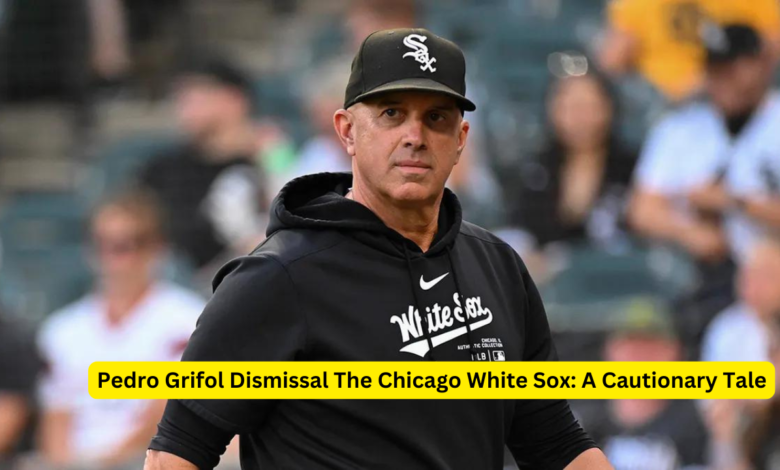Pedro Grifol Dismissal The Chicago White Sox

Pedro Grifol was appointed as the manager of the Chicago White Sox, the fanbase was hopeful. They envisioned a new chapter for the team, one filled with victories and renewed energy. But reality hit hard, and after a grueling season that saw a historic 21-game losing streak, the White Sox made the tough decision to fire Grifol. While some see this as just another managerial casualty in professional sports, there’s more to this story than meets the eye. This article delves deep into the events that led to Grifol’s dismissal, what it signifies for the White Sox, and the broader implications for the team’s future.
The Rise and Fall of Pedro Grifol
Pedro Grifol’s Arrival and Early Challenges
Pedro Grifol stepped into the role of manager with a respectable reputation. He was known for his strategic mind and ability to connect with players. However, the Chicago White Sox weren’t just any team; they were a team in desperate need of direction. Grifol’s early tenure was marked by challenges, including injuries to key players and a roster that struggled to find its rhythm.
The White Sox had high expectations, and the pressure was immense. Unfortunately, the team couldn’t meet these expectations, and the losing streak began to loom large. Pedro Grifol attempts to shake things up, from lineup changes to strategic shifts, failed to yield results. It wasn’t long before fans and analysts alike began questioning his ability to lead the team out of the slump.
The 21-Game Losing Streak: A Breaking Point
The 21-game losing streak was a nightmare for everyone involved with the Chicago White Sox. It wasn’t just the length of the streak that was alarming, but the manner in which the team lost. Close games slipped through their fingers, errors were made at critical moments, and the team’s morale seemed to hit rock bottom. Pedro Grifol post-game interviews became increasingly somber, and it was clear that the situation was weighing heavily on him.
During this period, rumors began to circulate about unrest in the locker room. Some speculated that Grifol had lost the confidence of his players, while others pointed to a disconnect between the coaching staff and the front office. Regardless of the specifics, it was evident that the team was spiraling, and something had to change.
The Decision to Fire Grifol: Analyzing the Timing
The decision to fire Pedro Grifol, coming just two days after the team finally snapped their losing streak, was surprising to many. Why make the change after a win? The answer lies in the broader context of the season. While the losing streak was certainly a factor, the White Sox’s struggles went far beyond those 21 games. The front office likely saw the end of the streak as an opportunity to reset, hoping that a new voice in the locker room could salvage what was left of the season.
But was it the right decision? Firing a manager mid-season is always a gamble. It can inject new energy into a team, but it can also create instability. For the White Sox, the hope was clearly that a change at the top could reignite the team’s competitive spirit. However, only time will tell if this move will pay off in the long run.
Lessons Learned and Future Implications for the White Sox
The Role of Leadership in Professional Sports
One of the key takeaways from Pedro Grifol tenure with the White Sox is the importance of leadership. In professional sports, a manager’s role goes beyond just making strategic decisions; they are also responsible for managing personalities, maintaining team morale, and serving as the face of the organization. Pedro Grifol struggled in these areas, and it ultimately cost him his job.
For the White Sox, the challenge now is finding a leader who can not only navigate the complexities of the game but also inspire and unify the team. This is no small task, and it will be interesting to see who they choose as Grifol’s successor.
The Impact on Player Development and Team Culture
Another significant aspect of Pedro Grifol dismissal is its impact on player development and team culture. A manager’s influence on young players cannot be overstated. The White Sox have a roster filled with promising talent, and the next manager will play a crucial role in shaping their careers.
Moreover, the culture within the team is at a critical juncture. The losing streak and the subsequent firing of Grifol have likely left the locker room in a state of flux. The new manager will need to establish a strong culture of accountability and resilience to ensure that the team can move forward from this turbulent period.
The Broader Implications for the Chicago White Sox Franchise
Pedro Grifol firing also has broader implications for the Chicago White Sox as a franchise. The decision signals that the front office is not afraid to make bold moves in the pursuit of success. However, it also raises questions about the stability of the organization. Constant turnover in leadership can lead to uncertainty and undermine long-term planning.
The White Sox are at a crossroads. They must now decide what kind of franchise they want to be: one that is willing to make tough decisions in the short term or one that prioritizes stability and long-term growth. The choices they make in the coming months will have a lasting impact on the team’s future.
Real-World Examples and Outcomes
Case Studies: Success Stories and Cautionary Tales
To understand the potential outcomes of the White Sox’s decision to fire Grifol, it’s helpful to look at similar situations in professional sports. There have been instances where a mid-season managerial change has sparked a dramatic turnaround. For example, when the Miami Marlins fired manager Jeff Torborg in 2003, they went on to win the World Series under his replacement, Jack McKeon.
However, there are also cautionary tales. The Detroit Tigers, for instance, fired manager Brad Ausmus in 2017 after a disappointing season. The team has struggled to find consistent success since, highlighting the risks associated with frequent managerial changes.
Lessons Learned from Grifol’s Tenure
The key lesson from Grifol’s tenure is that success in professional sports requires more than just tactical knowledge. It requires the ability to lead, inspire, and adapt. Pedro Grifol failure to do so ultimately led to his downfall. For aspiring managers and coaches, his experience serves as a reminder of the importance of these softer skills in achieving long-term success.
Conclusion: What’s Next for the Chicago White Sox?
The firing of Pedro Grifol marks the end of a challenging chapter for the Chicago White Sox. However, it also presents an opportunity for the team to redefine its future. As the organization begins the search for a new manager, the decisions they make will shape the trajectory of the franchise for years to come.
Open-Ended Question for Readers:
What do you think the Chicago White Sox need in their next manager to turn things around, and how do you see this decision impacting the team’s future? Share your thoughts in the comments below.




